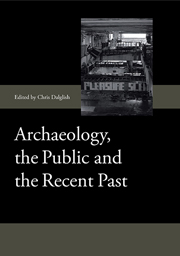Book contents
- Frontmatter
- Contents
- List of Figures and Tables
- List of Contributors
- Archaeologists, Power and the Recent Past
- Part One Constructing Memories, Constructing Communities
- Open-Air Museums, Authenticity and the shaping of Cultural Identity: An Example from the Isle of Man
- Loyal yet Independent: Archaeological Perspectives on Remembering and Forgetting World War I on the Isle of Man
- Public Engagement at Prestongrange: Reflections on a Community Project
- Archaeology for All: Managing Expectations and Learning from the Past for the Future – the Dig Manchester Community Archaeology Experience
- Rediscovering, Preserving and Making Memories at Community Archaeology
- Part Two Engaging the Past, Engaging the Present
- Index
Loyal yet Independent: Archaeological Perspectives on Remembering and Forgetting World War I on the Isle of Man
from Part One - Constructing Memories, Constructing Communities
Published online by Cambridge University Press: 05 September 2013
- Frontmatter
- Contents
- List of Figures and Tables
- List of Contributors
- Archaeologists, Power and the Recent Past
- Part One Constructing Memories, Constructing Communities
- Open-Air Museums, Authenticity and the shaping of Cultural Identity: An Example from the Isle of Man
- Loyal yet Independent: Archaeological Perspectives on Remembering and Forgetting World War I on the Isle of Man
- Public Engagement at Prestongrange: Reflections on a Community Project
- Archaeology for All: Managing Expectations and Learning from the Past for the Future – the Dig Manchester Community Archaeology Experience
- Rediscovering, Preserving and Making Memories at Community Archaeology
- Part Two Engaging the Past, Engaging the Present
- Index
Summary
The material evidence for World War I on the Isle of Man includes both the sites and artefacts from the internment camps for alien civilians held by the British, and the war memorials to the Manx who lost their lives through conflict. The physical form of the memorials, and the selective processes of remembering that involve them, demonstrates how material heritage is active in contemporary society. This can be contrasted, using Connerton's (2008) types of cultural forgetting, with those aspects of the wartime experience that are not recalled and where the material evidence is destroyed or hidden. Archaeologists should consider how the materiality of the past, or its eradication, are both key elements in the complex processes of making and re-making social memory.
INTRODUCTION
The Isle of Man is an independent Crown Dependency, with the Queen as head of state and an ambivalent and at times uncomfortable relationship with the British government. In the early 20th century the Lieutenant Governor was a powerful and significant figure on the island, balancing and indeed controlling the powers of the Tynwald parliament. From 1902 the Lieutenant Governor was Lord Raglan, who had come from the post of under Secretary for War and been a major organiser of the Boer War campaigns. He was an intensely conservative figure, charming to those in his circle but with firm views on how the island should be run, and on its relationships with the British Government.
- Type
- Chapter
- Information
- Archaeology, the Public and the Recent Past , pp. 35 - 54Publisher: Boydell & BrewerPrint publication year: 2013



